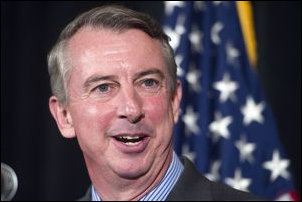
Ed Gillespie. Photo credit: Associated Press
Writing in the Richmond Times-Dispatch today, Bart Hinkle takes Republican gubernatorial candidate Ed Gillespie to task for asserting that he’s going to shape a “dynamic economy that creates jobs” in contrast to the anemic economy under the tutelage of Democrat Terry McAuliffe. As Hinkle correctly observes, a governor’s actions have a limited impact on a state’s economy. Gillespie’s claims are as empty as those of McAuliffe, who takes credit for having overseen the creation of thousands of jobs during his administration.
When the federal government accounts for 30 percent of the state’s GDP, there is nothing that a governor of any partisan or ideological stripe can accomplish in three or four years to offset cuts to the defense, intelligence and homeland security sectors. As for the corporate-investment deals announced by the Virginia Economic Development Partnership, to which every Virginia governor since time immemorial has attached himself, rare has been the instance in which a governor’s involvement proved decisive.
What governors can do is promote public policy that creates a more favorable business climate. Gillespie has some good ideas on that score — modernize the outdated tax code, repeal outdated regulations, and foster entrepreneurship and small business formation. But let’s be realistic. A case can be made that reforming the tax code could give a modest boost to Virginia economic growth, but Virginia’s tax code is business friendly already and any gains would be incremental. As for the repealing-outdated-regulations trope, every governor campaigns against red tape. But very few have the stomach for tackling the regulations backed by powerful constituencies that truly do stifle job creation, such as occupational licensing and the Certificate of Public Need.
As McAuliffe has said repeatedly, and as I have emphasized on this blog, tens of thousands of jobs are going unfilled in Virginia because companies cannot find employees with the skills to fill them. The job of equipping Virginians with the requisite skills falls to the public sector, both K-12 schools and higher education. If a governor truly wants to be known as a “jobs” governor, he will it make his No. 1 priority to make government get better at its core mission of educating and training its citizens.
Government can do other important things, such as enabling the evolution of the built environment toward more cost-efficient human settlement patterns and creating a transportation system to serve it. To my mind, this would entail a market-driven shift to an Uber-flavored “smart growth” future. As in so many areas, the biggest obstacle is outdated regulations, particularly zoning codes. I blogged about that topic for years, but I despair that it is too esoteric for most of the voting population to understand, which means that it’s too esoteric for elected officials to care about.
In any case, overhauling K-12, higher ed, transportation and land use cannot be accomplished in a single gubernatorial term. It is the project of a generation, which means it requires a broad social consensus. We need to abandon the idea of governors (or presidents) as heroic champions who can single-handedly revive ailing economies. They can’t. They need to concentrate on what they can do.


